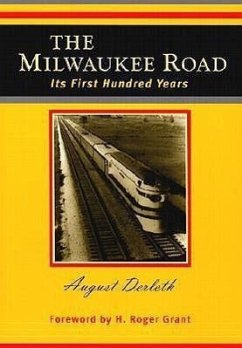From its incorporation in 1847 in Wisconsin Territory to its first run in 1851--twenty miles between Milwaukee and Waukesha--to its later position of far-flung power, the Chicago, Milwaukee, St. Paul &Pacific Railroad Company had a vivid history. By 1948, the Milwaukee Road had more than 40,000 employees and maintained more than 10,000 miles of line in twelve states from Indiana to Washington. Also in 1948, August Derleth's popular and well-crafted corporate history celebrated the strength and status of this mighty carrier. On February 19, 1985, the railroad became a subsidiary of Soo Line Corporation and its identity vanished overnight. Nonetheless, it remains a romantic memory, and Derleth's book remains the only complete history of this innovative and dynamic railroad.
Hinweis: Dieser Artikel kann nur an eine deutsche Lieferadresse ausgeliefert werden.
Hinweis: Dieser Artikel kann nur an eine deutsche Lieferadresse ausgeliefert werden.


![Condition and Prospect of the Detroit and Milwaukee Railway [microform]: From Detroit to Grand Haven, 185 Miles Condition and Prospect of the Detroit and Milwaukee Railway [microform]: From Detroit to Grand Haven, 185 Miles](https://bilder.buecher.de/produkte/66/66157/66157404m.jpg)
![Letter to the Bondholders of the Detroit and Milwaukee Railroad Company [microform] Letter to the Bondholders of the Detroit and Milwaukee Railroad Company [microform]](https://bilder.buecher.de/produkte/64/64533/64533465m.jpg)




